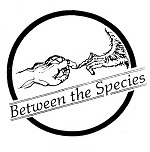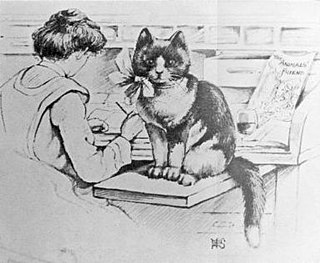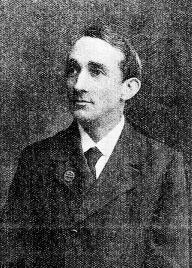
Cruelty to animals, also called animal abuse, animal neglect or animal cruelty, is the infliction by omission (neglect) or by commission by humans of suffering or harm upon non-human animals. More narrowly, it can be the causing of harm or suffering for specific achievements, such as killing animals for entertainment; cruelty to animals sometimes encompasses inflicting harm or suffering as an end in itself, referred to as zoosadism.

Andrew Linzey is an English Anglican priest, theologian, and prominent figure in Christian vegetarianism. He is a member of the Faculty of Theology at the University of Oxford, and held the world's first academic post in Ethics, Theology and Animal Welfare, the Bede Jarret Senior Research Fellowship at Blackfriars Hall.

Anthrozoology, also known as human–nonhuman-animal studies (HAS), is the subset of ethnobiology that deals with interactions between humans and other animals. It is an interdisciplinary field that overlaps with other disciplines including anthropology, ethnology, medicine, psychology, social work, veterinary medicine, and zoology. A major focus of anthrozoologic research is the quantifying of the positive effects of human–animal relationships on either party and the study of their interactions. It includes scholars from fields such as anthropology, sociology, biology, history and philosophy.
RSPCA Australia is an Australian peak organisation established in 1981 to promote animal welfare. Each state and territory of Australia has an RSPCA organisation that predates and is affiliated with RSPCA Australia.

Emilie Augusta Louise "Lizzy" Lind af Hageby was a Swedish-British feminist and animal rights advocate who became a prominent anti-vivisection activist in England in the early 20th century.

The Cruelty to Animals Act 1876 was an Act of the Parliament of the United Kingdom which set limits on the practice of, and instituted a licensing system for animal experimentation, amending the Cruelty to Animals Act 1849. It was a public general Act. The Act was replaced 110 years later by the Animals Act 1986.
Women have played a central role in animal advocacy since the 19th century. The animal advocacy movement – embracing animal rights, animal welfare, and anti-vivisectionism – has been disproportionately initiated and led by women, particularly in the United Kingdom. Women are more likely to support animal rights than men. A 1996 study of adolescents by Linda Pifer suggested that factors that may partially explain this discrepancy include attitudes towards feminism and science, scientific literacy, and the presence of a greater emphasis on "nurturance or compassion" amongst women. Although vegetarianism does not necessarily imply animal advocacy, a 1992 market research study conducted by the Yankelovich research organization concluded that "of the 12.4 million people [in the US] who call themselves vegetarian, 68% are female, while only 32% are male".

The Humanitarian League was a British radical advocacy group formed by Henry S. Salt and others to promote the principle that it is wrong to inflict avoidable suffering on any sentient being. It was based in London and operated between 1891 and 1919.
The concept of moral rights for animals is believed to date as far back as Ancient India, particularly early Jainist and Hindu history. What follows is mainly the history of animal rights in the Western world. There is a rich history of animal protection in the ancient texts, lives, and stories of Eastern, African, and Indigenous peoples.

Lewis Gompertz was an English writer and inventor, and early animal rights and veganism advocate. He was a founding member of the English Society for the Prevention of Cruelty to Animals; later the RSPCA, and the Animals' Friend Society for the Prevention of Cruelty to Animals.

The Animal Defence and Anti-Vivisection Society (ADAVS) was an animal rights advocacy organisation, co-founded in England, in 1903, by the animal rights advocates Lizzy Lind af Hageby, a Swedish-British feminist, and the English peeress Nina Douglas-Hamilton, Duchess of Hamilton.
Hilda Kean is a British historian who specialises in public and cultural history, and in particular the cultural history of animals. She is former Dean and Director of Public History at Ruskin College, Oxford, and an Honorary Research Fellow there. Kean is a visiting professor of History at the University of Greenwich and an adjunct professor at the Centre for Australian Public History at the University of Technology Sydney.
The Oxford Group or Oxford Vegetarians consisted of a group of intellectuals in England in the late 1960s and early 1970s associated with the University of Oxford, who met and corresponded to discuss the emerging concept of animal rights, or animal liberation.

Political Animals and Animal Politics is a 2014 edited collection published by Palgrave Macmillan and edited by the green political theorists Marcel Wissenburg and David Schlosberg. The work addresses the emergence of academic animal ethics informed by political philosophy as opposed to moral philosophy. It was the first edited collection to be published on the topic, and the first book-length attempt to explore the breadth and boundaries of the literature. As well as a substantial introduction by the editors, it features ten sole-authored chapters split over three parts, respectively concerning institutional change for animals, the relationship between animal ethics and ecologism, and real-world laws made for the benefit of animals. The book's contributors were Wissenburg, Schlosberg, Manuel Arias-Maldonado, Chad Flanders, Christie Smith, Clemens Driessen, Simon Otjes, Kurtis Boyer, Per-Anders Svärd, and Mihnea Tanasescu. The focus of their individual chapters varies, but recurring features include discussions of human exceptionalism, exploration of ways that animal issues are or could be present in political discourse, and reflections on the relationship between theory and practice in politics.
Clare Palmer is a British philosopher, theologian and scholar of environmental and religious studies. She is known for her work on environmental and animal ethics. She was appointed as a professor in the Department of Philosophy at Texas A&M University in 2010. She had previously held academic appointments at the Universities of Greenwich, Stirling, and Lancaster in the United Kingdom, and Washington University in St. Louis in the United States, among others.

Between the Species: A Journal for the Study of Philosophy and Animals is a peer-reviewed academic journal devoted to philosophical examinations of human relationships with other animals. It is, in part, a continuation of Ethics & Animals (E&A), a journal which ran from 1980 to 1984. Between the Species was founded as a print journal in 1985, published by the Schweitzer Center of the San Francisco Bay Institute/Congress of Cultures. The print version ceased publication in 1996. It was revived as an open access online-only journal in 2002. It is published by the Philosophy Department and Digital Commons at the California Polytechnic State University; Joseph Lynch is the current editor-in-chief.
Vegan studies or vegan theory is the study of veganism, within the humanities and social sciences, as an identity and ideology, and the exploration of its depiction in literature, the arts, popular culture, and the media. In a narrower use of the term, vegan studies seek to establish veganism as a "mode of thinking and writing" and a "means of critique".

Anna Jessey Wade was an English suffragist and campaigner for animal welfare, known for founding the Cats Protection League. She co-founded a number of other animal welfare organisations and helped create and was editor of the feminist gender studies journal Urania.

Henry Brown Amos was a Scottish activist for animal rights, vegetarianism, humanitarianism and against vivisection and hunting. He also worked for some time as a draper. Amos held a number of positions within organisations dedicated to animals and vegetarianism, and co-founded the League Against Cruel Sports in 1924.












